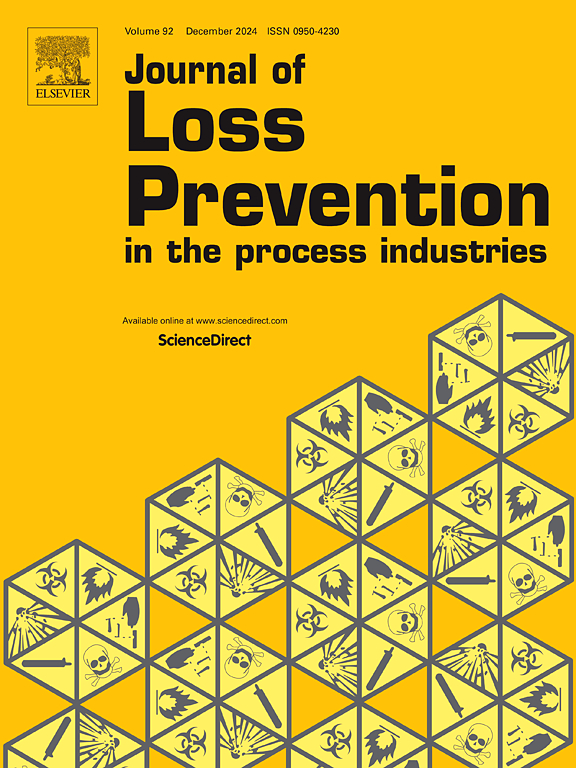Mechanism of the effect of sodium chloride impurities on flash evaporation after accidental rupture of a storage tank
IF 4.2
3区 工程技术
Q2 ENGINEERING, CHEMICAL
Journal of Loss Prevention in The Process Industries
Pub Date : 2025-05-30
DOI:10.1016/j.jlp.2025.105695
引用次数: 0
Abstract
BLEVE is a serious industrial accident that often occurs in liquid storage tanks where flammable or pressurized liquids are stored. The presence of liquid in the tank enhances the intensity of the liquid's superheating and boiling, which greatly increases the danger of the storage tank. In this study, based on a small high-pressure storage tank rupture and release experimental platform, the boiling phenomenon of liquids containing NaCl impurities during rapid depressurization was investigated, and the mechanism of NaCl-enhanced superheated boiling of the medium was determined. NaCl impurities dissolved in water provide a vaporization core through which bubbles nucleate directly, resulting in a large number of bubbles and enhanced boiling. The degree of NaCl-enhanced superheated boiling does not increase linearly with concentration, and a transition occurs at a saturated boiling concentration of 1 mol/L. Furthermore, this turnaround concentration diminishes with increasing initial pressure under the coupled effect of two factors: increasing number of vaporized cores and increasing pressure. Gas-phase venting is not a necessary condition for the occurrence of superheated flash boiling. Significant superheated boiling can also occur when sodium chloride impurities are present, as liquid phase venting increases the degree of boiling.This paper provides some value for the safe handling and storage of superheated liquids containing NaCl impurities.
储罐意外破裂后氯化钠杂质对闪蒸影响的机理
BLEVE是一种严重的工业事故,经常发生在储存易燃或加压液体的储液罐中。储罐内液体的存在,增强了液体过热沸腾的强度,大大增加了储罐的危险性。本研究基于小型高压储罐破裂释放实验平台,研究了含NaCl杂质液体在快速降压过程中的沸腾现象,确定了NaCl增强介质过热沸腾的机理。溶解在水中的NaCl杂质提供了汽化核,气泡通过汽化核直接成核,导致气泡大量产生,沸腾加剧。nacl增强过沸程度不随浓度线性增加,在饱和沸腾浓度为1 mol/L时发生过渡。此外,在汽化岩心数量增加和压力增加这两个因素的耦合作用下,随着初始压力的增加,这种周转浓度降低。气相排气不是发生过热闪沸的必要条件。当氯化钠杂质存在时,也会发生明显的过热沸腾,因为液相排气增加了沸腾的程度。本文对含NaCl杂质的过热液体的安全处理和贮存有一定的参考价值。
本文章由计算机程序翻译,如有差异,请以英文原文为准。
求助全文
约1分钟内获得全文
求助全文
来源期刊
CiteScore
7.20
自引率
14.30%
发文量
226
审稿时长
52 days
期刊介绍:
The broad scope of the journal is process safety. Process safety is defined as the prevention and mitigation of process-related injuries and damage arising from process incidents involving fire, explosion and toxic release. Such undesired events occur in the process industries during the use, storage, manufacture, handling, and transportation of highly hazardous chemicals.

 求助内容:
求助内容: 应助结果提醒方式:
应助结果提醒方式:


